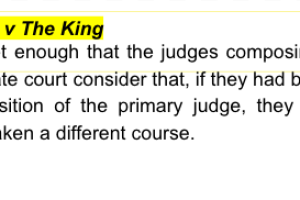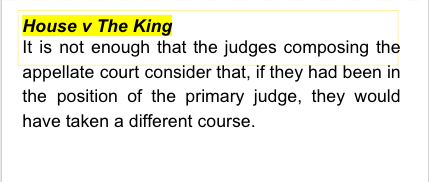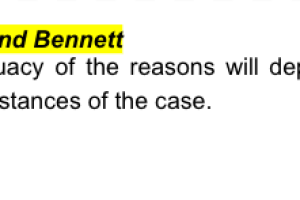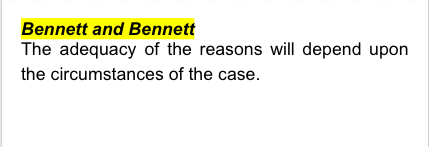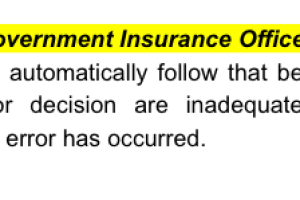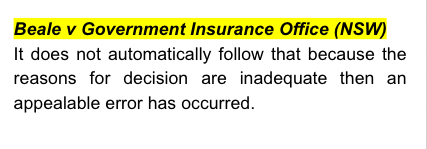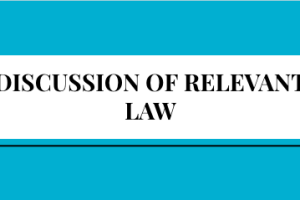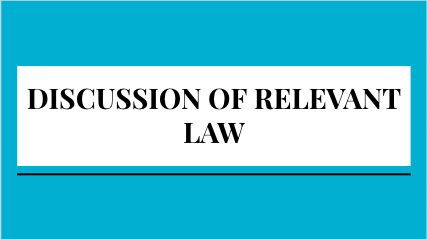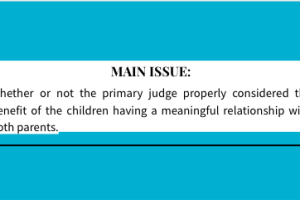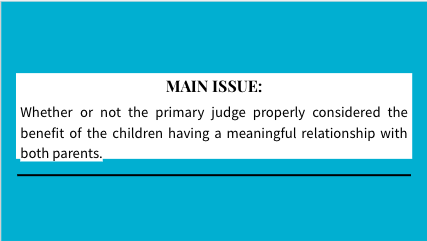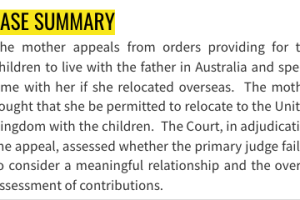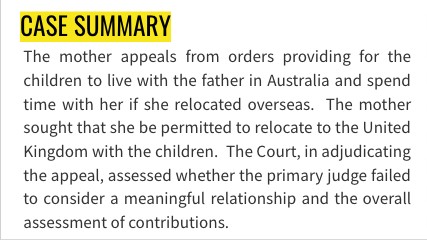- · 4748 friends
Mother Appeals Parenting Orders in Favor of Father

Yarrow & Yarrow [2022] FedCFamC1A 135 (1 September 2022)

The mother appeals from orders providing for the children to live with the father in Australia and spend time with her if she relocated overseas. The mother sought that she be permitted to relocate to the United Kingdom with the children. The Court, in adjudicating the appeal, assessed whether the primary judge failed to consider a meaningful relationship and the overall assessment of contributions.

Facts:
Ms Yarrow (“the mother”) appeals from final parenting and property settlement orders made on 24 December 2021 by a judge of the Federal Circuit and Family Court of Australia (Division 2). The parenting orders provided for the parties’ two children to live with Mr Yarrow (“the father”) in City E and, in the event she relocated to Country D (“Country D”), to spend time with the mother during school holidays. The orders further provided that, in the event, the mother did not relocate to Country D, the children would live with her and the father on an 8/6 nights per fortnight regime. The property orders provided that two real properties (one in City E and one in City C) be sold, and the net sale proceeds be divided 54 per cent to the father and 46 per cent to the mother.
In the event the mother did not relocate to Country D, the sale proceeds of the City C property were to be divided so as to achieve an overall division of property 57/43 per cent in the mother’s favour. In broad terms, otherwise, the parties kept the property and financial resources in their own respective names. In 2002, the father moved to Country D where he met the mother. In 2007, the parties commenced cohabitation in City C and married in 2008.
They thereafter had two children; W born in 2013, and X born in 2016. They predominantly lived in City C until 2017, when they moved to Country K for 12 months, and thereafter relocated with the children to City E, Australia. The parties separated in early 2020, and the father commenced these proceedings in March of that year. On 29 April 2020, interim orders were made providing for the parties to have equal shared parental responsibility for the children, who would live with the mother and spend time with the father for five nights a fortnight.
Both parties were restrained from removing the children from City E. These were the orders in place at the time of the trial in September 2021. The mother primarily sought to relocate with the children to Country D, and for them to spend time with the father, the frequency and duration of which would depend upon whether he lived in Australia or Country D. The father’s primary position was for the children to remain in City E and to live between him and the mother.
The ICL supported the father’s case. As the primary judge recorded, the mother’s evidence implied that she would not necessarily relocate to Country D if the Court did not permit the children to do so.

Issue:
Whether or not the primary judge properly considered the benefit of the children having a meaningful relationship with both parents.

Applicable law:
Family Law Act 1975 (Cth) ss 75 - provides for the matters to be taken into account in relation to spousal maintenance.



Analysis:
The mother contended that the primary judge concluded that there could be no meaningful relationship between the father and the children if they lived with the mother in Country D. However, neither expressly nor impliedly did the primary judge so find. Rather her Honour’s starting point was that the children presently had a meaningful relationship with both parents, and by implication, would benefit from that continuing. As to the future, her Honour adopted the conclusion of the Family Report writer that the children’s presently meaningful relationship with the father “is not likely to be as meaningful compared to if they were to continue to spend significant and substantial time with him”.
The primary judge did not conclude, whether expressly or by implication, that the only way a meaningful relationship could be maintained was by the parties living in geographic proximity. There was no conclusion that the children could not enjoy a meaningful relationship with the father if they lived in Country D, and hence unsurprisingly no reasoning for such a conclusion was advanced. No error in respect of inadequate exposure of reasoning is otherwise discernible. Her Honour’s conclusion that the mother’s overall contributions were “somewhat more” than the father’s was open to her on the evidence. No challenge to the factual basis for that finding was sought to be made
Her Honour was critical of the lack of detail in the mother’s evidence supporting her proposal, including there being little evidence about the cost and practicality of travel between Australia and Country D, the children’s likely housing, schooling and healthcare in Country D, nor how they would be cared for in the event she was able to obtain employment, the prospect of which itself was supported by little material. However, to point to such weakness in the mother’s case is not to require her to establish a compelling reason for relocation. It is simply identifying that absent such material, it is difficult to conclude that the children’s best interests lie in relocation.
Conclusion:
The appeal is allowed in part. Orders 29–38 made by the Federal Circuit and Family Court of Australia (Division 2) on 24 December 2021 are set aside. As to her Honour's expression of conclusion about the parties' contributions in a qualitative way, the case is remitted to her Honour for the provision of further reasons for her assessments.


